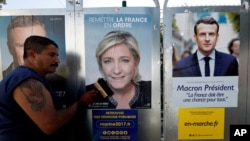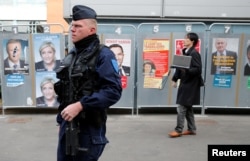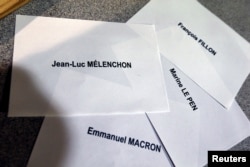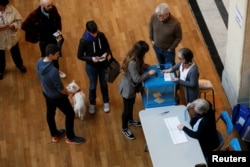Voters across France went to the polls in an election that is one of the closest watched in decades, with 11 candidates, ranging from the extreme right to the extreme left, vying for the French presidency.
Tight security was in place after a terrorist attack in Paris on Thursday, just days before the voting.
About 50,000 police officers backed by 7,000 soldiers, including special forces, were deployed to the streets for security amid tensions following the attack claimed by the Islamic State terrorist group. The shooting along the iconic Champs-Elysees in the heart of Paris left one police officer dead and several other people injured.
State of emergency, tight security
This is the first election to be held under a state of emergency called after the 2015 Paris attacks, and observers say last week’s shooting could bring out many voters who had otherwise planned to abstain.
In a tweet a day after the Champs Elysees shooting, U.S. President Donald Trump said, “The people of France will not take much more of this. Will have a big effect on presidential election!”
Despite predictions of low voter turnout, witnesses said lines formed at voting stations in Paris’ 15th arrondissement before opening hours and turnout was reported to be heavy at various polling stations across the country. Government officials said turnout in the afternoon was (69 percent) a percentage point lower that it was in the first round of the 2012 elections.
Pre-election polls show tight race
Leading in pre-election polls has been Emmanuel Macron, a center-left former economy minister who is pro-Europe and pro-business with close ties to unpopular Socialist President Francois Hollande. His appeal lies mainly in France’s prosperous urban areas where globalism has benefited many.
A close second has been Marine Le Pen, who wants to end most immigration to France, especially from Muslim countries. She also wants France to leave the European Union. Her strongholds are largely in formerly industrial areas of France where unemployment is high and so is disillusionment with the modern economic and social order.
Another top contender is former Prime Minister Francois Fillon, a center-right social conservative who favors cuts in public spending and pushing for deep reforms in the European Union.
Last-minute decisions
Analysts and voters interviewed see this as the most unpredictable election since World War II. One-third of voters were undecided days before the balloting.
In the last few weeks before the vote, far-left candidate Jean-Luc Melenchon surged in the polls and so did discussion of the previously obscure candidate in social media.
Among the ways his campaign lured young voters was through the release of a video game in which a player pretending to be Melenchon walks the streets and takes money from men in suits. The player is shown in a battle against the rich and powerful.
Anger at the establishment is the sentiment driving voters in an election in which security, France’s lagging economy, its 10-percent unemployment rate, and Islamist extremism are issues on the minds of those on the left and on the right.
That, analysts say, is what is driving large numbers of people, including some of the middle and upper class residents of Paris, to vote for candidates of the extreme, like Le Pen and Melenchon.
“Some of them for the thrill of it. It’s the principle, you know. Like playing Russian roulette, but politically.Some others it would be because they despise the elite of this country,” said Thomas Guénolé, a political analyst in Paris, told VOA.
In France, the prevailing candidate in a presidential race needs an absolute majority. If no one wins a majority, the top vote-getters in Sunday’s poll will face off in a second round on May 7.
Polls closed at 1800 UTC.







